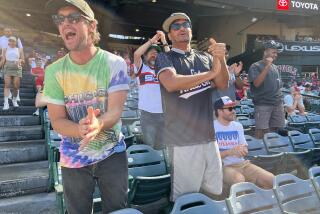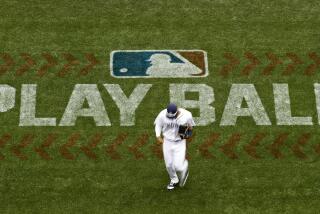If They Don’t Play It’s a Shame: Baseball Fans Sweat Lockout
Like junkies suddenly forced to go cold turkey, hard-core baseball fans are battling withdrawal as a major league lockout drags on with no end in sight.
“It makes you grumpy. You’re unhappy,” said Jim Reach, 50, of Fountain Valley. “It really changes your life.”
For one thing, the lockout that took effect Feb. 15 has ruined many a spring pilgrimage to the diamond shrines of Palm Springs, Florida, and Arizona for a little baseball with one’s golf.
“I’ve been out here for 17 years and 12 of those we’ve gone down to Palm Springs to watch those games,” said Angels Booster Club President Rick Kanger. “We already had reservations for this year, but we had to cancel them, swallow real hard and go from there.”
Still, Orange County baseball fans are finding other ways to get their fix of the national pastime. They’re dusting off old World Series tapes and popping them into the VCR, tuning in to ESPN for college baseball or simply settling for basketball or hockey.
“I’m watching NCAA basketball, and I’m surviving,” said Mike McMaines, 30, of Newport Beach. “I only miss it when I look on TV and see Donald Fehr (head of the players’ union) whining about how the players can’t get by on their multimillion-dollar salaries.”
For the die-hard fan who craves live action, there’s always a college game to catch at UC Irvine or Cal State Fullerton, which, it just so happens, boasts the No. 1-ranked women’s softball team in the country. The ever-popular slow-pitch softball leagues are also going full swing with more than 1,000 teams countywide.
“It’s (softball), not baseball,” admits Mike Stan, an Anaheim recreation coordinator. “But you’ve got the bat, the ball, you’re making the plays and you’re still winning and losing games.”
However, Brian Maag, 36, of El Toro, is one fan who doesn’t buy Stan’s philosophy that a bat and an oversized ball is better than none at all. “Yeah, there are the colleges,” Maag said. “But my son plays Little League and that’s baseball too.”
These are trying times for baseball fans struggling to remain optimistic that their idols and the major league owners will see the error of their ways and settle a dispute over players’ compensation.
Ironically, the Angels were scheduled to play their season opener April Fool’s day--the first game in a Freeway Series against the Dodgers. But don’t expect to find anyone laughing at KMPC, the radio voice of the Angels.
The Los Angeles station has plans to air 600 hours of major league baseball programming this season. If the games were to fall through, the station would be left with nothing to string between the commercials and thousands of dollars in lost revenue.
“That’s a lot of air time to fill,” Executive Producer Steve Bailey said. “I’m telling you, we’ve got a lot of people around here with their fingers crossed and very anxious.”
Bailey’s not sure what the station will do if the players call a strike. Run some old talk shows. Or, pull out a relic from the station archives like the 1961 Angels game in Baltimore, the team’s first as an American League franchise.
“But how many old games can you put on that the fans will tolerate or bother to listen to,” Bailey lamented. “If this thing goes on, we’re really going to have to scramble.”
Yet Anaheim Stadium officials are crying the loudest.
For every regular season Angels home game that gets canceled, the city stands to lose $50,000. The Angels were originally scheduled to play 82 games at Anaheim Stadium. Now, all that is up in the air. “Clearly this is a very serious matter in terms of finances,” said Bill Sweeney, Anaheim Stadium finance manager. “The effect of a strike would be rather dramatic.”
About 500 part-time ushers and concessionaires have been sidelined by the lockout, some of whom rely on their stadium jobs for health insurance.
“It’s the only job I have,” said Betty Murphy, 49, of Garden Grove, who has sold hot dogs and sausages at Anaheim Stadium for the last 16 years. “I haven’t started looking for another job yet; I’m just hoping this will end.”
Meanwhile, fans furious with “greedy” players and owners are venting their anger at the cash register, letting baseball cards of current players rot on the shelves.
“People seem to be saying, ‘Hey, if you guys don’t want to play, we’re not going to buy your cards any more,” said Moe Bonenfant, an Anaheim baseball card trader. “Now, people are going back to the old cards and finishing up their old-timer sets.”
Some stores are beginning to worry that fan disgust will leave them stuck with merchandise that was ordered and paid for months ago. “Little League sales are carrying us through right now,” said Bee Jablonski, who runs a sports memorabilia shop in Anaheim. “But if the owners and the players don’t get themselves together soon, I’m going to be having a sale out in the parking lot.”
The rotisserie leagues are suffering too. In these fantasy games, players “draft” their own teams and score points based on their players’ performances during the season. At stake, besides couch potato bragging rights, are thousands of dollars in winnings. Spring training is usually when fantasy players look for unknowns with stellar potential.
To understand the intensity of a fantasy player, consider that when Wade Boggs’ mother died suddenly two years ago, some rotisserie players were most concerned about how long the Boston third baseman would be out for the funeral because they wanted him back in their lineup.
When former Houston Astros pitcher J.R. Richard had a stroke, “They (fantasy players) didn’t care about him,” said Reach, a rotisserie player. “They just wanted to know how long it would be until he got better so he could play on their team.”
The fantasy leagues have spawned their own mini-industry--businesses that, for a fee, track the statistics of major league players for the rotisserie players.
They too are feeling the pinch.
“We’re one of the businesses caught in the middle,” said Jack Irby, co-owner of Roti Stats in Fountain Valley. “I sure hope this lockout ends soon. It’s working its way all the way down the food chain.”
For fans, there’s not much to do but wait.
“It’s difficult to understand a player getting $2 million standing on the picket line,” said Angels fan Larry Fick, 49, of Westminster.
More to Read
Go beyond the scoreboard
Get the latest on L.A.'s teams in the daily Sports Report newsletter.
You may occasionally receive promotional content from the Los Angeles Times.





